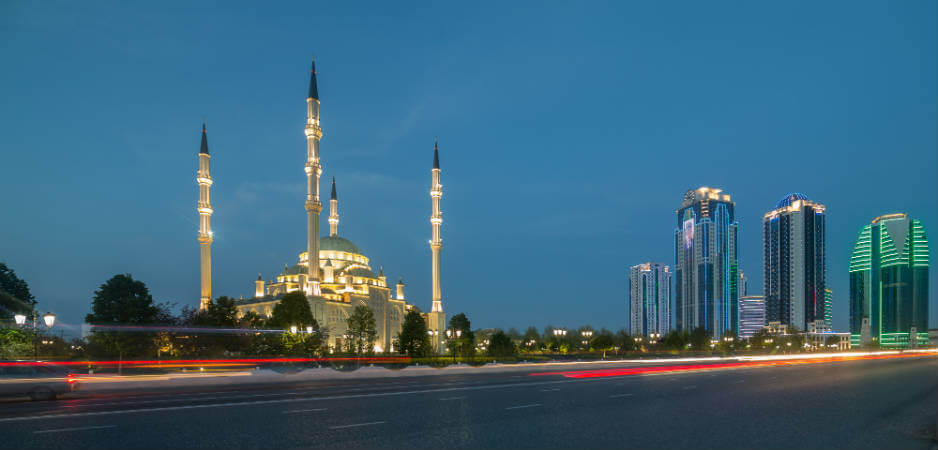Detention, torture and murder of gay men in Chechnya continue the litany of human rights abuses in the country.
“Imagine knowing that you’ve ruined not only your own life but the life of your entire family,” Akhmed tells The Guardian. “I’ve always just wanted to make my mother happy and proud. I was ready to marry. I would have taken all these problems with me to the grave. I could never have imagined in my worst nightmares that I would be sitting here in front of a journalist and saying: ‘I’m a Chechen and I’m gay.’”
Chechnya, Russia’s mutinous, mountainous republic in the restive North Caucasus region, is known for little more than the rampant violence and human rights abuses that have continued unabated since the First Chechen War in 1994. Forced disappearances, abductions, torture (including women), extrajudicial killings, terrorism, child marriage, political assassinations and organized crime have been the status quo before Ramzan Kadyrov — the current leader of Chechnya — assumed the presidency in 2007, and have not gone out of fashion in the decade since.
What Akhmed spoke out about is the latest, blood-chilling addition to the litany of repression and abuse coming out of the republic: the reported detention of gay men, torture and, in at least three cases, death.
Detention, Torture, Death
In a special report by Russia’s leading investigative newspaper, Novaya Gazeta, published on April 1, Elena Milashina and Irina Gordienko have exposed a recent wave of persecution of what in Russian is referred to as “non-traditional sexual orientation.” A subsequent report exposed the existence of a secret prison in Argun, a short drive from the capital Grozny, where victims have reported being subjected to electric shocks, beatings, humiliation and extortion.
Several victims have independently testified to having been blackmailed and threatened by the police. Akhmed, who escaped Chechnya, tells of receiving a phone call from the police saying that his family members will be held hostage until he returns. One man told Novaya Gazeta that he was “held on the hook” by the police for over two years, paying monthly bribes to prevent being exposed. A second victim speaks of biting his hands to draw blood to counter the pain from the torture. It helped, he says.
In the ultra-conservative, religious Chechnya this is a lucrative racket for the police. Homosexuality is a taboo, and honor killings are common. In denouncing the investigation, Kadyrov’s press secretary, Alvi Karimov, pointed out that “In accordance with local traditions, if someone as much as points a finger at a man from a clan, there is no need to detain him — for a 100 years, until the generation changes, not one woman will marry a man from that clan.”
Echoing former Iranian President Mahmoud Ahmadinejad’s claim there were no gay people in Iran, Karimov went on to say that “If there were such people in Chechnya, the security forces would have no fuss with them, because their relatives would dispatch them to an address from which no one returns.”
Heda Saratova, a member of Chechnya’s human rights council, went further: “I am a Chechen, and what you are saying is worse than war … I would like to assure you that in our Chechen society, a man who respects himself, traditions and customs would … do everything possible to make sure that there are no such people in our society,” she told Moscow Speaks radio.
She later apologized, claiming momentary affectation following the shock of the initial news that there are in fact homosexuals in Chechnya.
It is this shame that the security services exploit. As one victim points out, there are only three ways to get out once you’ve been detained: pay a steep bribe, give up other homosexuals or be released back to your family, often as a “bag of bones” following the savage beatings by both prison guards and other prisoners, with the danger of further punishment, ostracism or death.
State of Lawlessness
According to Novaya Gazeta, “In the last two years — right after the assassination of Boris Nemtsov, for which the organizers went unpunished — mass repressions in Chechnya have become a bad tradition. And with each time these repressions become more and more catastrophic in their scope and ever more absurd in their motivation.” Victims are kept in prison — located on Kadyrov Street — alongside jihadists who traveled to Syria and their relatives, drug addicts and everyone else the Chechen state sweeps up in its wake.
Kadyrov, who was only 27 when he was handed Chechnya by Russian President Vladimir Putin following his father’s assassination in 2004, has ruled the republic with the proverbial iron fist. During the Second Chechen War, Kadyrov headed his father Ahmad’s feared militia, known as Kadyrovtsy, who were connected to thousands of forced disappearances, including the abduction of eight family members of then-President Aslan Maskhadov, himself killed in 2005.
According to the human rights group, Memorial, between 2002 and 2006 over 1,000 people went missing — data that only covered a quarter of Chechen territory. According to Kavkaz Uzel, official figures range between 3,000 and 5,000, confirmed by Memorial. A 2007 Human Rights Watch (HRW) report described the areas under Kadyrov’s control as being engulfed by “atmosphere of fear,” with those who survived the two brutal wars cowered to the point of being afraid to as much as complain.
As one-time Kadyrov bodyguard Umar Ismailov testified before being gunned down on a Vienna street, Kadyrov was not only present at tortures, but “amused himself by personally giving prisoners electric shocks or firing pistols at their feet.”
Many opponents turned up dead. Two of the Yamadaev brothers — Kadyrov’s main political rivals — were shot, one in Moscow and the other in Dubai; a third brother claimed an assassination attempt against him. Human rights defenders Natalia Estemirova, Zurema Sadiuayeva, lawyer Stanislav Markelov and Novaya Gazeta journalist Anastasia Baburova were all killed. The unsolved roots of Russia’s most notorious murders — including those of Novaya Gazeta’s Anna Poliltkovskaya (killed on Putin’s birthday) and opposition leader Boris Nemtsov (shot in front of the Kremlin) — disappear into Chechnya.
In the run-up to last year’s presidential election, which Kadyrov won with a modest 98% of the vote, HRW reported authorities “viciously and comprehensively” cracking down on all dissent. One story of a man, who complained to President Putin about the state of infrastructure in Chechnya during an annual televised call-in, saw himself and his family running for life across the mountains to escape what the deputy minister of internal affairs, Apti Alautdinov, reminded him in person as Politkovskaya’s and Nemtsov’s fate.
In March 2016, the head of the Committee to Prevent Torture, Igor Kalyapin, was assaulted in the center of Grozny. Previously, the organization’s offices were ransacked and torched, and activists ambushed and beaten.
With families of terrorists and jihadists subjected to collective punishment, raids on Chechen villages following which people disappear without a trace, the director of Memorial, Andrey Cherkasov, writes that the Novaya Gazeta investigation hasn’t revealed anything new — secret prisons have been a staple of Chechen power structure all through the “counterterrorism operation” launched by Putin in 1999.
But the scope of this brutality is likely to be much more widespread. “In Chechnya there is a much scarier problem: People are so frightened, squashed, that they don’t complain,” Kalyapin tells Memorial. “People know that we will send the complaint to the Investigative Committee, and as soon they will start trying to do anything, Kadyrovtsy will pay them a visit and will start to pressure them in such a way that the initial torture will seem like flowers.”
Novaya Gazeta confirms that in its practice, Russia’s Investigative Committee doesn’t actually investigate such complaints. When one of the victims tried to file a complaint against his detention in Moscow, it wasn’t accepted. In 2006, according to the US State Department, the human rights ombudsman received some 3,000 complaints of abuses in prisons. Kalyapin says that the last complaint against Kadyrov’s inner circle was submitted in 2015.
All this makes the reaction from the Kremlin’s spokesman, Dmitry Peskov, for the victims to pursue a legal course of action through the courts seem laughable; he dismissed it as “not a prerogative of the president’s administration.”
Price of Peace
It is important to remember that all of this is taking place inside a subject of the Russian Federation. After Chechnya was systematically destroyed in the course of the two wars, Moscow poured in endless resources to rebuild and sustain the republic. More than 80% of Chechnya’s budget comes from Russia, meaning, as Boris Vishnevsky points out, that in 2017 Russians will pay 640 rubles (around $10) each in taxes to Chechnya — money that goes toward funding military rule, state brutality and circumvention of Russia’s laws, as well as ostentatious showing off. (Kadyrov’s private jet is said to be the most spacious on the market.)
In a recent interview, Milashina says that the reason for such a strong reaction to her investigation is the inherent weakness of Kadyrov’s regime. With rumors of a plot against the president by the surviving Isa Yamadaev, security structures “predict that if things continue like that, there could be a revolt in Chechnya. because the population of Chechnya is in an awful situation. It can’t last long,” she says.
Indeed, HRW cites a local resident: “Now when I think back to the war, … we were not as frightened as now. Fear of a bomb, fear of a bullet — it’s something we could live with … But this … utter humiliation — I just cannot deal with it, I’m ashamed of myself. Every day, they take away another piece of my dignity.”
Chechnya is a closed region, with tight control over information, and the fact that this information got out at all is a lucky event, according to Russia’s LGBT-rights activist involved in attempts to help gay men escape from the republic.
But now that the information is out, Russia’s continuing turning of a blind eye to the human rights situation in the region may come at a high price. If indeed Milashina’s assessment is correct, the Kremlin may be subsidizing what in the end might erupt the brutally-won “stability.” While LGBT rights in Russia have been under assault — with anti-gay propaganda laws, vigilante persecutions and violence against gay men — the situation in Chechnya is a throwback to the Nazi imprisonment of homosexuals during the Third Reich. Words fail at this comparison.
“Nobody knows how many people have been killed,” Akhmed concludes in his interview with The Guardian. “It’s just impossible to contact most people or to find anything out. But I would be amazed if it was only three.”
The views expressed in this article are the author’s own and do not necessarily reflect Fair Observer’s editorial policy.
Photo Credit: VitaliyPozdeyev
Support Fair Observer
We rely on your support for our independence, diversity and quality.
For more than 10 years, Fair Observer has been free, fair and independent. No billionaire owns us, no advertisers control us. We are a reader-supported nonprofit. Unlike many other publications, we keep our content free for readers regardless of where they live or whether they can afford to pay. We have no paywalls and no ads.
In the post-truth era of fake news, echo chambers and filter bubbles, we publish a plurality of perspectives from around the world. Anyone can publish with us, but everyone goes through a rigorous editorial process. So, you get fact-checked, well-reasoned content instead of noise.
We publish 2,500+ voices from 90+ countries. We also conduct education and training programs
on subjects ranging from digital media and journalism to writing and critical thinking. This
doesn’t come cheap. Servers, editors, trainers and web developers cost
money.
Please consider supporting us on a regular basis as a recurring donor or a
sustaining member.
Will you support FO’s journalism?
We rely on your support for our independence, diversity and quality.







